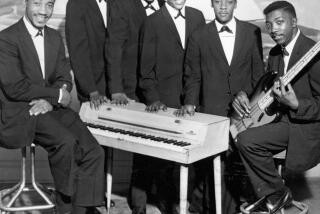Roger Williams dies at 87; âAutumn Leavesâ pop pianist found commercial success
Roger Williams, a pianist who was one of the most popular instrumentalists of the mid-20th century and who hit No. 1 on the pop charts in 1955 with his arpeggio-strewn âAutumn Leaves,â has died. He was 87.
Williams died Saturday at his Los Angeles home of complications from pancreatic cancer, his former publicist, Rob Wilcox, told the Associated Press.
âThe biggest thing I have to offer,â Williams told Time magazine in 1968, âis emotion. I think I play with more feeling than any other pop pianist.â
He was the rare instrumental pop artist to strike a lasting commercial chord. Between 1955 and 1972, Williams had 22 hit singles â including âBorn Freeâ in 1966 â and 38 hit albums, according to the All Music Internet database.
âAutumn Leavesâ was the most successful song of Williamsâ career, and the first No.1 instrumental song on the Billboard charts of the rock era, according to âThe Billboard Book of Number 1 Hits.â
After Williams was signed to Kapp Records in the early 1950s, label president Dave Kapp asked Williams on a Friday if he would like to record âAutumn Leavesâ the following Monday.
âI said, âYou mean âFalling Leavesâ? I didnât even know the title,â Williams told The Times in 1996. âI stayed up Friday and then Saturday night working on an arrangement.â
âThe first thing that came to mind was to play all those runs down the keyboard,â Williams said in an earlier Times interview. âI tried to make it sound like falling leaves.â
The first recording run-through ran slightly over three minutes, so Kapp asked him to speed it up because disc jockeys at the time wouldnât play a song longer than that length, Williams often said.
The second time around, âAutumn Leavesâ came in at 2:59.
âI owed two monthsâ rent on our apartment,â Williams said in the 1996 Times interview. âI had a wife and a baby at the time. My fondest dream for âAutumn Leavesâ was that it would pay the rent. And boy, itâs been doing it ever since.â
The tunes he played were so familiar âthey almost play themselves,â the New York Times said in a 1972 review of a performance that included âOn a Clear Day,â âHello Dollyâ and âThe Impossible Dream.â
If dissected, Williamsâ approach could seem âtrite and oversimplified,â the review said. âThere is a cumulative charm to the unadorned simplicity and sincerity of his performance that can eventually win over even the most cynical listener.â
The son of a Lutheran minister, he was born Louis Weertz on Oct. 1, 1924, in Omaha and grew up in Des Moines.
At 3, he toddled toward the piano and just started playing, Williams often recalled.
While majoring in piano at Iowaâs Drake University, he began developing a style that was a fusion of jazz, classical and pop.
When a school official overheard him playing the show tune âSmoke Gets in Your Eyes,â he was expelled because the school had a âclassics onlyâ policy, Williams later said.
So he joined the Navy during World War II and won the middleweight boxing championship at his base, in Idaho, the Los Angeles Times reported in 1959.
In the Navy, he developed an aptitude for engineering and earned a bachelorâs degree in the subject in 1949 at Idaho State University. He followed it with a masterâs in music in 1950 at Drake.
While enrolled at the Juilliard School in New York, he won âArthur Godfreyâs Talent Scoutsâ on television playing a symphonic arrangement of âI Got Rhythm.â
Kapp insisted that the pianist âhave a name that would stand up anywhereâ and changed it to Roger Williams after the founder of Rhode Island.
Williamsâ Top 10 albums include âSongs of the Fabulous Fiftiesâ (1957), âTillâ (1958), âMariaâ (1962) and âBorn Freeâ (1966).
In the early 1970s, his popularity faded but he went on to record more than 100 albums and performed in concert as recently as March. He claimed to know 10,000 songs by heart, often fielding requests, and was long featured at the Crystal Cathedral in Garden Grove.
He played for nine U.S. presidents, starting with Harry S. Truman, who requested Bach and Ravel. Truman then played his own version of the Chopin waltz, Williams told the Atlanta Journal Constitution in 2004.
Williams had three children with his first wife but after âone tour too manyâ the couple divorced, he later said.
After he married Louise De Carlo in 1985, they maintained houses across the street from each other in Encino, an idiosyncrasy night-owl Williams attributed to conflicting schedules. They eventually divorced.
Of his talent, Williams said in 2007 in the Allentown, Pa., Morning Call: âI know I was given a gift, and once in a while I go to church and say, âHey, thanks.â I play my religion through my fingers.â
More to Read
Start your day right
Sign up for Essential California for the L.A. Times biggest news, features and recommendations in your inbox six days a week.
You may occasionally receive promotional content from the Los Angeles Times.





















































